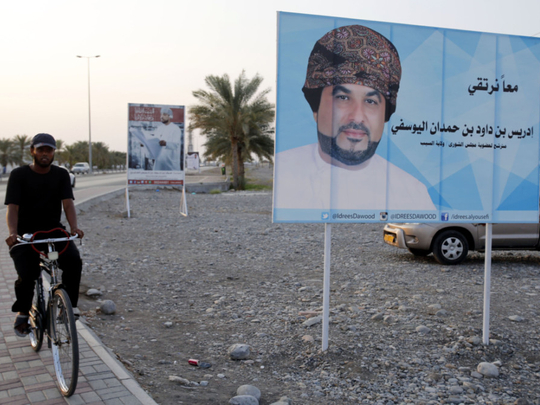
Muscat: As Omanis prepare to vote in Sunday’s elections for the 85 seats in consultative Shura Council, questions are being raised about the influence of tribalism and social backgrounds of candidates vying for seats in the legislature.
Observers and analysts saw that the tribe plays a major role in voting behaviour and is considered the main social component for candidates to rally around for support. Sunday’s election will cover 11 governorates and 61 provinces in the country.
Mohammad Al Futaisi, a prominent writer, said that voting for candidates based on their tribal background is one of the major factors negatively affecting the political culture of Oman.
“Despite the severity of this phenomenon, it is still ongoing. The phenomenon may be declining slightly,” he added, “but the decline is not reassuring enough”.
Ahmad Al Mukhaini, a political affairs researcher, believes that tribalism plays a major role in the election of candidates to the council. “There are no alternative platforms besides tribalism through which candidates can campaign with equal force to win votes and support,” he says.
Al Mukhaini suggests the use of national unions and professional institutions for campaigning as a way to reduce the influence of tribalism in the elections. Raising the minimum level of education for candidates can also play a positive role, he said.
Al Mukhaini noted that a study by the Interior Ministry showed that 85 per cent of Shura members elected in 2007 were voted on the basis of their tribal backgrounds.
The study was conducted by the election committee at the Interior Ministry through the distribution of a questionnaire to more than 3,000 voters nationwide.
Al Futaisi said tribe-based voting has negatively affected the performance of the council. “Some of the members had little familiarity with parliamentary work and did not have the skills needed to be lawmakers in a body that is supposed to play a major role in the formation of political, social and legislative foundations of the country,” he explained.
Mohammad Al Araimi, a blogger, said that some voters cast their ballots for personal benefit and privileges promised to voters by the candidate.
He added that picking the right candidate on the basis of merit, not tribe, requires changing concepts and procedures that nourish the awareness of the national, as well as enlightening him or her about the importance of the role played by the council with regard to legislation and supervision.
Sameera Al Shamakhi, an Ibri province candidate for the coming election, believes that the role of tribalism in the Shura election can be reduced by creating awareness among voters.
She said that Omani women have less luck in the Shura election due to the influence of the male dominated tribes, as many cast their votes for men from their own tribe.
Sameera, however, disagrees with the call to increase the minimum education requirements for candidates in elections.
“It’s discriminatory, and curbs the freedom of a large segment of people from running for election,” said Al Shamakhi.
Ahmad Al Rashdi, a Nakhal province Shura member, said that Omani voters have enough awareness to pick the right candidate.
He added that an awareness campaign entitled “Your Vote is Integrity”, organised by the Ministry of Interior, is highlighting the importance of the Majlis Al Shura election among Omanis.
Observers still believe that the role of tribalism will continue for years to come in Shura elections.
The number of candidates in this year’s elections stands at 596, 20 of whom are women.
The number of eligible voters in the elections stands at 600,000.
Oman’s Shura Council was established in 1991 to replace the Consultative State Council, which lasted from 1981 until 1991.
The Shura Council is the lower house of the Council of Oman and has enjoyed some legislative and regulatory powers since 2011.












